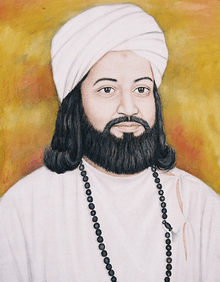Waris Shah
| Waris Shah | |
|---|---|
 | |
| Native name | وارث شاہ |
| Born |
1722[1] Jandiala Sher Khan, Sheikhupura, Punjab[1] |
| Died |
1798 (aged 76)[1] Malka Hans, Pakpattan, Punjab[1] |
| Genre | Sufi poetry |
| Notable works | Heer Ranjha- by Waris Shah - A Classic Book on their love story[1] |
Waris Shah (Punjabi: وارث شاہ (shahmukhi), ਵਾਰਿਸ ਸ਼ਾਹ (gurmukhi); 1722–1798) was a Punjabi Sufi poet of Chishti order, known for his contribution to Punjabi literature.[1]
Background
Waris Shah was born in Jandiala Sher Khan, Punjab, present-day Pakistan into a reputed Sayyid family and was a descendant of Sayyid Muhammad Al-Makki through his son Sayyid Badruddin.[2] His father's name was Gulsher Shah and mother's name was Kamal Banu. Waris's parents are said to have died when he was young. Waris spent years in search of the perfect spiritual guide.[3] Waris Shah acknowledged himself to be a disciple of an ustad from Kasur, namely Hafiz Ghulam Murtaza from whom he received his education. After completing his education, Waris moved to Malka Hans, a village twelve kilometres north of Pakpattan. Here he resided in a small room, adjacent to a historic mosque now called Masjid Waris Shah, until his death.[1]
His mausoleum is a place of pilgrimage today, especially for those in love. The mausoleum complex was completed in 1978 and is a mixture of the Lahore School of Architecture and Tughlaq Architecture.
Works
Waris Shah is primarily known as the author of Heer Ranjha whose verse is a treasure-trove of Punjabi phrases, idioms and sayings. His minute and realistic depiction of each detail of Punjabi life and the political situation in the 18th century, remains unique and the entire poem is an album of colourful and enchanting pictures of life in the Punjab, of varied views but always deeply absorbing.[4]
Waris Shah was a consummate artiste, a deeply learned person in Sufi and domestic cultural lore. It is said in history books that the story of romantic love is a poetic expression of the mystical love of the human soul towards God – the quintessential subject in Sufism and a recurring theme in both Muslim and Hindu mysticism.[5]
Some authors also suggest that it was Waris Shah's own unrequited love towards a girl named Bhag Bhari that later became the foundation of the poem.
Examples
Many verses of Waris Shah are widely used in Punjab in a moral context, for instance:[6]
- Naa adataan jaandiyan ne, Bhavein katiye poriyan poriyan ji (A man never abandons his habits, even if he is hacked to pieces)
- Waris rann, faqir, talwar, ghora; Chare thok eh kisse de yar nahin (Waris says that woman, begger, sword and horse, these four are never anyone's friends)
- Waris Shah faqir di aqal kithe; eh pattian ishq padhiyan hun (It is beyond the wisdom of faqeer Waris Shah (to write this verse), (But) these lessons are taught by Love)
- Eh rooh qalboot da zikr sara nal aqal de mel bulaya ee (This entire reference is about Soul meeting with the Divine, Beloved which has been contrived with great wisdom)
Portrayal in media
Waris Shah's life has been fictionalised in Punjabi-language films. A 1964 Pakistani film titled Waris Shah featured Inayat Hussain Bhatti in the title role. Another movie on the life of Waris Shah Waris Shah: Ishq Daa Waaris was released in India in 2006 with Gurdas Mann as Waris Shah.[7]
Many Punjabi folk love stories in history including Heer Ranjha, Sohni Mahiwal and Mirza Sahiban are said to have happened near the banks of ancient Chenab River. Out of the five rivers of the Punjab, the river Chenab is forever linked and often mentioned in the history books of these folk love tales.[8]
References
- 1 2 3 4 5 6 7 eBook in Shahmukhi Punjabi language on Academy of the Punjab in North America website Retrieved 29 May 2018
- ↑ Naqvi, Sayyid Maqsood, ed. (1991). Riaz Al-Ansab. Izhar Sons Printer. p. 684.
- ↑ Sakhi Sult̤ān Mohammad Najib-ur-Rehman. Perfect Spiritual Guide (Murshid-e-Kamil Akmal). Sultan-ul-Faqr Publications.
- ↑ Chopra, R M (1999). Great Sufi Poets of the Punjab. Calcutta: Iran Society.
- ↑ Complete Heer Waris Shah on Academy of the Punjab in North America website Retrieved 29 May 2018
- ↑ From the book Heer Waris Shah (Chatur Singh Jeevan Singh) in Gurmukhi Punjabi language
- ↑ 2006 film Waris Shah: Ishq Daa Waaris on IMDb website Retrieved 29 May 2018
- ↑ Syed Mehdi Bukhari (9 December 2015). "Chenab: Pakistan's river of love (including many pictures of Chenab river)". Dawn (newspaper). Retrieved 29 May 2018.